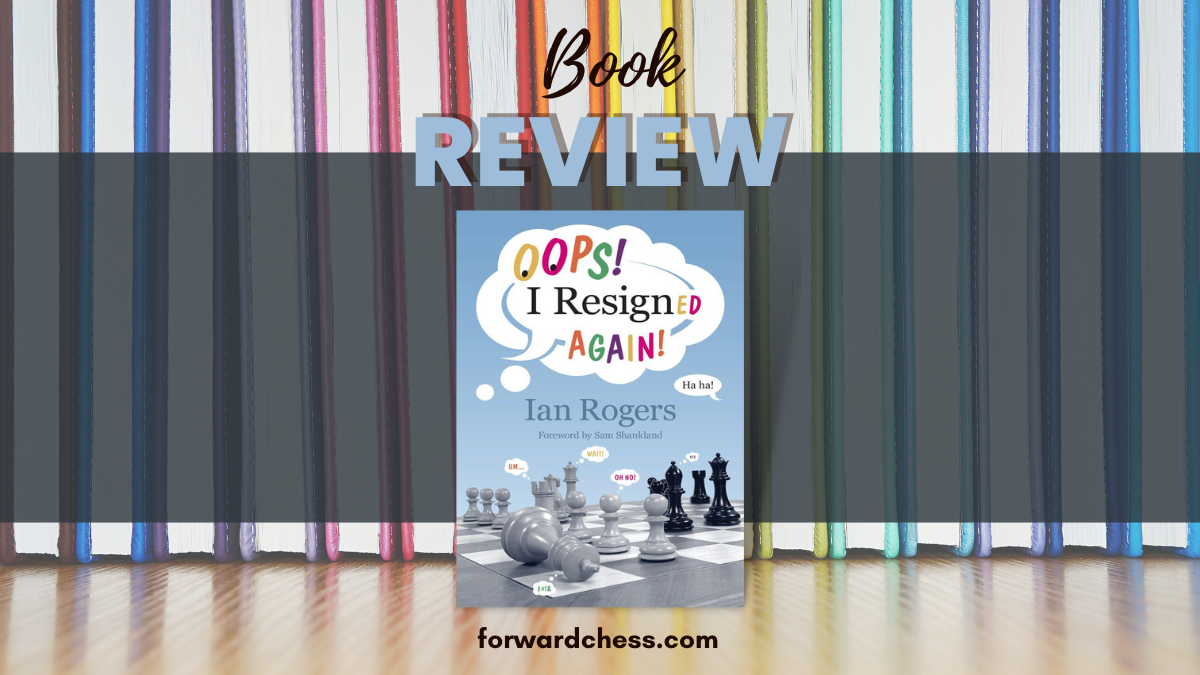Review of Oops! I Resigned Again
“After a tense fight, with the whole world watching, I resigned a technically drawn position. This was surely the most humiliating moment of my life.”
– GM Sam Shankland in the Foreword commenting on his game against Anish Giri in Wijk aan Zee, 2019.
Shankland’s misery against Giri is featured in Chapter 6 of this book by Australian GM Ian Rogers. Rogers was Australia’s top player for many years, although he is now retired from active play and mainly concentrates on writing.

This book contains 100 exercises where players have resigned prematurely when they either had a win or a draw. As Rogers writes:
“First, this is the perfect puzzle book for building up a player’s self-confidence. No matter what solution the reader discovers, it cannot possibly be worse than the choice made by the player in the game.
Second, schadenfreude! Resigning unnecessarily is the chess equivalent of slipping on a banana peel – one person’s misfortune, but inherently humorous to observers. Deriving joy from another chessplayer’s heartbreak and embarrassment may not be an honourable character trait, but they brought it on themselves, didn’t they?”
The exercises are split into 20 themed chapters with five puzzles in each chapter. The last chapter is somewhat different where the rules of the game also affect the result. For example, in one game a player resigned even though the final position was a stalemate! The arbiter later deemed that the game was a draw.
The exercises can be surprisingly difficult to solve because in many cases the resignations look so fair and reasonable! Hence, a thorough study of the book should increase the reader’s awareness to look for unusual saving moves in what look like hopeless positions.
In addition to the exercises themselves, Rogers has provided some excellent background to the games and what the players thought about their mistakes. This additional material adds color to the exercises and enhances the book considerably. Rogers also includes two of his own games in the book and the interesting background to them. He is also honest enough to admit to a bit of gamesmanship in one game.
Two examples from the book are given below, with annotations from the book.
This is a book to read for instruction and enjoyment. Yes, part of the enjoyment can be explained by schadenfreude, but that works both ways, and it is always possible that readers will find themselves saying in the future “Oops! I resigned again.”
Postscript
As a postscript, Shankland was recently (August 2022) on the losing end of another blunder that may be a candidate for inclusion in a possible sequel to this book. He played a move quickly against the Armenian GM Hovhannisyan at the 2022 Olympiad.
As chess.com reported:
“When Hovhannisyan played 90…Qg2, Shankland assumed that his opponent had played 90…Qh1+ and immediately replied with 91.Kc2 [of course, an illegal move] in a reflexive action. Shankland immediately realized the blunder and had to resign, as he had touched the white king and was forced to play 91.Kc1, when Black would win with 91…Qb2 92.Kd1. Instead, 91.Qc4+ would have drawn the game, and given his team a 2.5-1.5 victory in the match.”
A tragedy for Shankland and the USA team. Let’s hope he is not subject to the same vitriol as for the previous blunder.
Have any thoughts or questions? Let us know in the comments.
- 1000 Published books on Forward Chess - November 15, 2024
- Book Review: A Guide To Chess Improvement - September 9, 2024
- Review: Chess Coach by Vladimir Barsky - August 26, 2024
